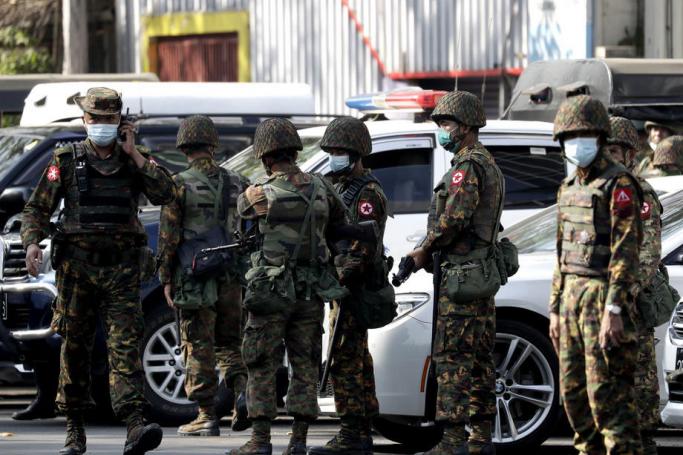Myanmar’s military junta has committed numerous abuses against the population that amount to crimes against humanity in the six months since the February 1, 2021 coup, Human Rights Watch said in a statement.
Since the military takeover, millions of people have taken to the streets across the country and peacefully protested for a return to a democratically elected civilian government. As part of a widespread and systematic attack on the population, security forces have repeatedly fired on and otherwise used excessive force to disperse and harm protesters. Police and soldiers have killed over 900 protesters and bystanders, including about 75 children, forcibly disappeared over 100 persons, and tortured and raped an unknown number in custody. Several thousand people have been arbitrarily arrested and detained.
“Myanmar’s junta has responded to massive popular opposition to the coup with killings, torture, and arbitrary detention of people who merely want last year’s election results to be respected and a government that reflects the popular will,” said Brad Adams, Asia director at Human Rights Watch. “These attacks on the population amount to crimes against humanity for which those responsible should be brought to account.”
The concept of crimes against humanity dates to at least 1915 and was part of the 1945 Charter of the International Military Tribunal that created the Nuremberg trials of Nazi leaders. Under the Rome Statute of the International Criminal Court (ICC), crimes against humanity are a series of offenses that are knowingly committed as part of a widespread or systematic attack directed against any civilian population.
The offenses of Myanmar’s junta against those opposed to the military coup have been both a widespread and systematic attack against the population, Human Rights Watch said. The nature of the response, broad-based and frequently consistent, reflects government policy rather than the actions of individual security personnel.
Apparent crimes against humanity committed since February 1 include murder, enforced disappearance, torture, rape and other sexual violence, severe deprivation of liberty, and other inhumane acts causing great suffering. Human Rights Watch previously found that Myanmar’s military had committed crimes against humanity against the ethnic Rohingya population in 2012-2013 and again in 2017 as part of campaigns of ethnic cleansing. The authorities are committing crimes against humanity of apartheid, persecution, and severe deprivation of liberty against Rohingya currently living in Rakhine State. The UN-backed Independent Investigative Mechanism for Myanmar (IIMM) is “closely following” events and is collecting evidence of possible crimes committed following the coup. The IIMM is also mandated to build case files to support efforts to hold individuals responsible for such crimes in criminal proceedings.
The United Nations, regional bodies, and governments, including the European Union, United States, and Association of Southeast Asian Nations (ASEAN), should respond to the continuing crimes against humanity in Myanmar by supplementing, strengthening, and coordinating international sanctions against the military and the State Administration Council (SAC) junta leadership under Sr. Gen. Min Aung Hlaing. Actions should include targeted sanctions on individuals, a global arms embargo, and financial restrictions that would reduce the junta’s revenues from extractive industries.
Governments should act to reduce the junta’s gas revenues, which are the military’s largest source of foreign currency income, adding up to about US$1 billion annually in duties, taxes, royalties, fees, tariffs, and other profits. The US, EU, UK, and others should block payments to the junta and state-owned enterprises from foreign-financed oil and gas projects, such as those operated by PTT, Total, and Chevron. Such measures can be designed to target the junta’s access to foreign accounts while allowing for the continued production of gas and electricity in the country.
Since the coup, concerns about vetoes by China and Russia have deterred the United Nations Security Council from adopting resolutions to address the human rights crisis in Myanmar. The Security Council should urgently take measures against the junta, including by referring the situation in the country to the International Criminal Court (ICC), Human Rights Watch said. The court’s prosecutor is currently investigating the crimes against humanity of deportation and persecution following the 2017 ethnic cleansing of the Rohingya, as those crimes were completed in Bangladesh, an ICC member. The council should follow the June resolution of the UN General Assembly with its own resolution to impose a legally binding arms embargo and targeted sanctions on junta officials and key military leaders.
The Security Council and UN member countries should end the pretense that ASEAN will place sufficient pressure on the junta to restore a democratically elected civilian government, release political prisoners, and hold those responsible for abuses to account, Human Rights Watch said. Since its summit meeting on April 24, ASEAN has failed to appoint a promised special envoy and has taken no meaningful steps to press the junta to address grave human rights concerns in Myanmar.
“The international response to the Myanmar junta’s crimes against humanity has been stymied by fears of Security Council vetoes, ASEAN’s feckless leadership, and the EU’s hesitance to target foreign gas companies,” Adams said. “The Security Council and influential countries, notably the US, EU, Australia, Japan, India, and Thailand, should apply coordinated sanctions to pressure the junta to end its brutal repression.”












